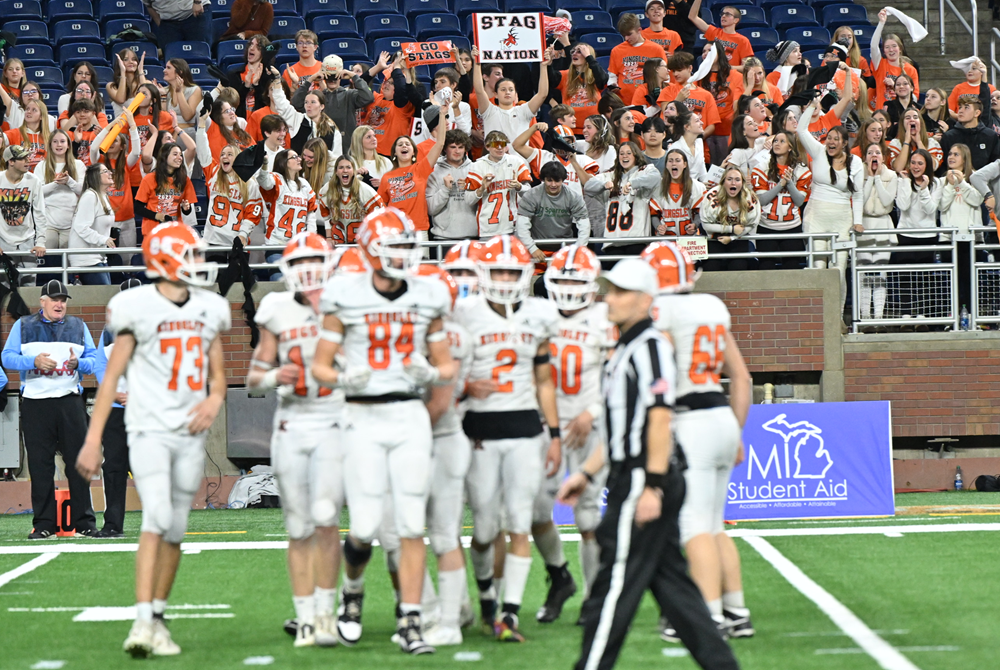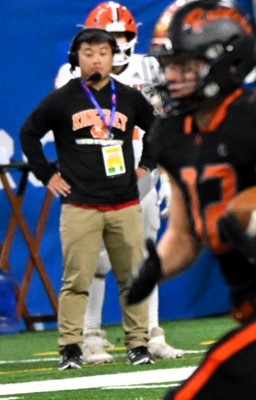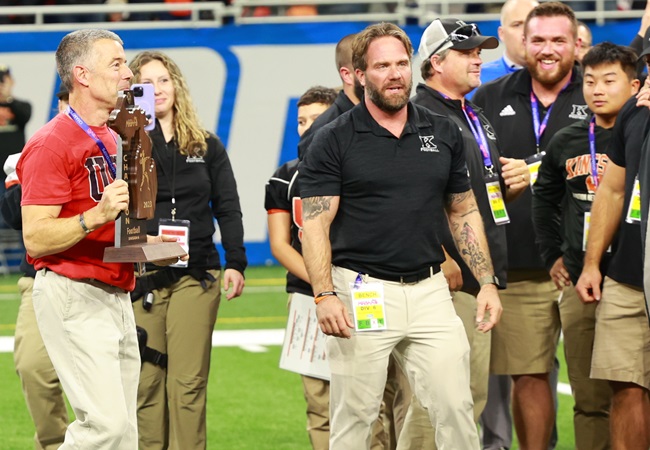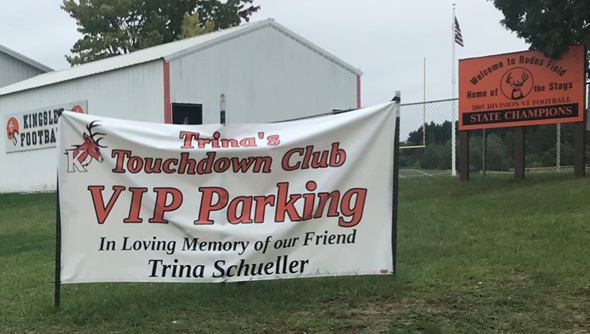
Next Play: Heart of the Matter
June 25, 2015
By Rob Kaminski
MHSAA benchmarks editor
From the retirement of NFL players in their mid-20s fearing long-term disability, to NASCAR drivers suffering injuries against concrete walls when alternative substances are available, to MLB outfielders running into barriers which place aesthetics and tradition over safety, the focus of highlight shows, apps and old-fashioned sports pages is shifting from action inside the lines to the sidelines.
As the reality of human vulnerability continues to invade our favorite escape from reality – athletics – protecting those in the spotlight needs to be Job 1.
While the quest for risk management protocols and health and safety provisions is a never-ending loop, the MHSAA bolted from the starting blocks with a 4H plan (Health Histories, Heads, Heat and Hearts) in the fall of 2009, a mission that enters the fourth turn for the 2015-16 school year.
And, as pulse quickens for the “Heart” stage in the fall, the MHSAA will continue to step up initiatives involving the other three initiatives during the next lap.Think of it as a continuous relay, where the baton is never dropped and fresh runners continue the race.
While organizations at other levels might be asking, “What to do,” the MHSAA is focusing on “What’s next?”
In this playbook the next plays are critical in allowing student-athletes to continue providing their communities with inexpensive and entertaining breaks from reality.
The Heart of the Matter
The 2015-16 school year brings with it an ambitious but paramount stage in the MHSAA’s mission to protect and promote the well being of student-athletes across the state.
Beginning in the fall, all high school varsity coaches will need to have Cardiopulmonary Resuscitation (CPR) certification by established deadlines which correspond to rules meetings.
The requirement is new, and the volume of personnel affected is vast. Yet, plans have been in place during the past few years, and schools in many communities are ahead of the curve.
“We’ve fielded some questions regarding the requirement, but I think that many of our schools already have similar protocols in place,” said MHSAA assistant director Kathy Vruggink Westdorp. “Increasingly, schools have become more prudent with regards to health and safety, and programs which emphasize these initiatives have been well received.”
Pete Ryan, MHSAA Representative Council member and athletic director for Saginaw Township Community Schools, concurs.
“The CPR requirement will not be a change for Heritage, as we have required CPR for eight years,” Ryan said. “We offer certification through our district nurse at no charge to the coaches and train about 20-30 coaches per year.”
The training vehicle might vary from district to district, but so long as the end result is certification, the coaches are free to take course by any means possible, whether online or in person.
“I think we’ll see a blend of online and classroom delivery,” Westdorp said. “And, I don’t think it will be just the coaches. At the MIAAA Conference (in March), school leaders were proactive in terms of certification for athletic directors, too.”
Mike Bakker, President of the Michigan Interscholastic Athletic Administrators Association and athletic director at Fenton High School, says CPR certification is a must in the risk management plans for all school settings.
“As an educator who has been a CPR and first aid instructor for the American Heart Association for a number of years, I am excited that the MHSAA will require CPR training for varsity coaches,” Bakker said.
“I certainly hope that in the future we will see that all coaches are trained in CPR. There might be a bit of a challenge at first to get our coaches trained, as schools look for the most economical as well as timely way to accomplish this mandate. The biggest hurdle that I can foresee is trying to find qualified trainers in all areas of the state that have multiple training dates available to fit the needs of such diverse coaching staffs.”
Ryan believes there is no substitute for the personal touch.
“We are doing in-person training which I feel is better because the individuals have to perform the procedure on the practice dummy," he said. "It’s simply more hands-on training.”
School nurses and trainers will play a substantial role in the certification process, as will community health organizations in many locales.
“In many of our schools, the health educators are certified to conduct CPR courses,” Westdorp said. “We’ve also had numerous calls from non-school entities alerting us to their availability to provide training, such as fire departments and local medical centers.”
Fenton is one such school with the luxury of on-site personnel to train its staff.
“We are fortunate in Fenton that our athletic trainer and athletic director are certified trainers so we can accomplish our training in-house, but I know that not all schools are as fortunate,” Bakker said.
Which is exactly why it’s necessary for coaches to become certified, and ideally not just the head coaches.
“It should be encouraged that all coaching staff become CPR certified so that they are able to take action, especially for schools which do not have an athletic trainer on staff and if the head coach is unavailable or present, in the unfortunate event that a potential cardiac emergency and/or sudden-death incident occurs,” said certified athletic trainer Gretchen Mohney, the Clinical Coordinator and Instructor for Western Michigan University Undergraduate Athletic Training Program.
Mark Mattson, athletic director at Traverse City Central, indicated that while not previously a requirement, the district has been proactive in prepping the coaches.
“From the moment the requirement was announced, we've been out in front of it,” Mattson said. “What’s great is, even though it hasn’t been a requirement for Traverse City Area Public Schools, many coaches are indeed already certified. The district also offers training sessions once a month and those dates are passed on to our coaches. Jason Carmien (AD at Traverse City West) and I have also had conversations about providing training at our preseason coaches meeting for those still in need prior to the start of the fall season.”
Coaches can also count on a familiar training source to come through for certification: the MHSAA Coaches Advancement Program. Westdorp, who heads up the expansive continuing education program for the state’s coaches, envisions coursework at select sites which will build CPR training into the session, giving attendees more added incentive and training opportunities.
CAP has also served as a siren to inform and remind the MHSAA’s constituents about the upcoming regulation.
“In all CAP courses this school year, we’ve been educating the coaches about the CPR requirement,” Westdorp said. “We also can format the courses to include a two-hour block for CPR certification within the CAP training. We could even do it with a league and conference group where we set up rotations, and the CPR aspect would be one of the rotations.”
Westdorp added that many athletic directors currently schedule coaches meetings and additional coursework around CAP training. It’s a perfect fit to deliver pertinent messages while all parties are in one location.
Such gatherings could also provide the opportunity for athletic leaders to share emergency action plans.
Along with the CPR component of the MHSAA’s health mission for the coming school year, schools will be asked to have in place and rehearse emergency action plans involving cardiac and other health-related emergencies.
To assist, schools will receive this summer the “Anyone Can Save a Life” program developed by the Minnesota State High School League and endorsed and delivered nationally by the National Federation of State High School Associations (check back for more on this program later this week).
“The ‘Anyone Can Save A Life’ initiative promotes the need to have and to practice planning for different kinds of emergencies; it involves students as well as adults; and it invites schools to include their previously existing plans,” said MHSAA Executive Director Jack Roberts.
“The result can be a fresh, comprehensive emphasis on preparing for emergencies well before they occur and then responding with more confidence when those emergencies inevitably happen. It is the perfect link between the last two years when we focused on heat illness and the next two years when we focus on sudden cardiac arrest,” Roberts added.
It will also be of primary concern to place automated external defibrillators (AEDs) in all schools and provide training for use of the devices.
The reasoning behind such a full-court press can be backed by simple facts.
- At any one time, an estimated 20 percent of the U.S. population congregates on school grounds, increasing the likelihood of school-based cardiac emergencies.
- Victims of SCA can be brought back to life by providing chest compressions and early defibrillation with an AED.
- Every second counts. When SCA occurs, chest compressions and the use of an AED need to start immediately.
- The AED can only help and will only deliver a shock if it is needed.
- The AED is very easy to use. Just turn it on and follow the voice prompts.
The best way to combat such situations is to create an atmosphere of preparedness; making sure all people in close proximity to potential victims can respond with quickness, confidence and precision to help reduce fatalities.
“In order for best practices to be achieved, it will require coordinated efforts to establish a quality emergency action plan among the entire athletic department staff, which should be practiced annually. This should be viewed as the first line of preparedness and defense in sports safety,” said James Lioy, an adjunct professor in athletic training at WMU who was named Michigan High School Athletic Trainer of the year in 2000-01.
That’s the goal of action plans such as those included in MHSAA CAP Levels and the Anyone Can Save A Life program.
“We've taken the ‘know-how’ out of it. You don't have to know how to perform the medical procedures to be trained and prepared as part of an effective emergency response team,” said Jody Redman, associate director of the Minnesota State High School League and one of the authors of the Anyone Can Save a Life program.
A common refrain in athletics to assign perspective on sport in society is, “It’s just a game; it’s not life or death.”
However, in the most dire of circumstances, participants indeed can be faced with life or death. Knowing how to respond can make all the difference.

Football Title Reflects Kingsley's Current Success, Recalls Loved Ones Passed
By
Tom Spencer
Special for MHSAA.com
December 1, 2023
Kingsley football fans have become pretty familiar with VIP parking for home games over the last couple of seasons.
 They may just start looking for a Kingsley VIP lot at Ford Field. The Stags just captured the MHSAA Division 6 championship trophy with a 38-24 victory over Almont, their second Finals championship and first since 2005.
They may just start looking for a Kingsley VIP lot at Ford Field. The Stags just captured the MHSAA Division 6 championship trophy with a 38-24 victory over Almont, their second Finals championship and first since 2005.
The road to the Finals started with Kingsley hosting two playoff games, allowing great use of the VIP Parking of Trina’s Touchdown Club. The lot is adjacent to the school’s Rodes Field and provided in loving memory of Katrina “Trina” Kay Schueller, who passed away Oct. 21, 2021, at Munson Medical Center.
Those playoff games filling Trina’s Touchdown Club’s parking lot featured wins over Mason County Central 61-12 and Manistee 37-18, and 51-27 over Gladstone in the Regional Final. Kingsley then traveled down the road and defeated Reed City 37-7 in the Semifinal.
There may not have been designated VIP parking in Cadillac and Ford Field for the Stags’ followers, but there were a lot of VIPs at both stadiums with Schueller on their minds. Pretty much everyone with an affiliation with the highly-successful program or familiarity with the community’s struggles have become VIPs to the Kingsley coaching staff and many others.
Most certainly among the VIPs are head coach Tim Wooer, assistant coach Conner Schueller, his brother Carter Schueller, and his father Mike Schueller.
Conner was set to play the biggest regular-season game of his career the day after his mom passed. It was the regular-season finale against rival Traverse City St. Francis.
Wooer vividly remembers the moments leading up to that matchup, noting how difficult it was for Conner. But his then-fullback and now-assistant coach demonstrated amazing strength and maturity he stills exhibits today.
 “He’s in his senior football season, and his mom is in the hospital for four weeks — he’s balancing that playing football and going to school,” Wooer recalled. “And then she passes, and he has the strength to come back to school and deliver the news to our team.
“He’s in his senior football season, and his mom is in the hospital for four weeks — he’s balancing that playing football and going to school,” Wooer recalled. “And then she passes, and he has the strength to come back to school and deliver the news to our team.
“I am sobbing watching this kid, and I’m just amazed,” Wooer continued. “The next night is Parents Night, and he’s on the field with his dad and brother without his mom.”
Conner still played, making a 4th-down goal line tackle to prevent a St. Francis touchdown. The Gladiators won the game, but Conner won the day, conquering much just to dress for the game.
The Stags went on to playoff wins over Kingsford 28-10 and Clare 32-6. They bowed out with a 33-18 Regional loss to Frankenmuth.
Conner’s junior year of 2020 had been cut short as the Kingsley was forced to forfeit its District Final to Reed City because several players and coaching staff tested positive for COVID-19. The Stags had Ford Field in their minds that season too after playoff wins over 38-13 Standish-Sterling 38-13 and Gladwin 63-16.
Conner, who celebrated his 20th birthday at Saturday’s Final, remembers his playing days and the challenges presented him.
“At the time it was ‘she’s not there,’ especially my senior year she wasn’t there to watch me and finish it out, but I know she’s watching above,” he said. “We were about to go play Reed City my junior year for Regionals, and everyone got sick and it ended our season unfortunately.”
Those challenges were on his mind at Ford Field, and running through his mind when he saw his brother and father in the stands. Carter, now a senior at Kingsley, had been unable to play football due to injuries.
“I thought about my brother – he unfortunately didn’t play this year due to his injuries, and I don’t really blame him for that,” Conner said. “I thought about him as well because it was just me and my dad and my brother now.
“It was very emotional,” Conner continued. “I got a glimpse of him in the strands.”
Carter also was filled with gratitude for the coaching staff for welcoming and mentoring him. He had become keenly aware of the amount of time coaches spend away from family at practices and going through film.
In addition to his family, Conner was thinking about many others in the Kingsley community – and other senior classes like his that didn’t get the chance to celebrate a championship.
He also was thinking about Justin Hansen, a 2003 graduate of Kingsley. Hansen was a captain on the 2002 conference championship team. He went on to become a special-operations Marine sergeant and was killed in action July 24, 2012, while deployed in Afghanistan. Hansen was on patrol as part of an operation in search of a high-value target when his team was hit with small arms fire.
 On Saturday, Wooer was wearing a red T-shirt with the letters “USA” on the front and the name “Hansen” on the back. It also featured the number 54, Hansen’s in high school.
On Saturday, Wooer was wearing a red T-shirt with the letters “USA” on the front and the name “Hansen” on the back. It also featured the number 54, Hansen’s in high school.
Wooer, who turned 54 in July, wore the shirt in Hansen’s memory knowing Hansen would be on the veteran coach’s mind and symbolizing Hansen’s presence with the team at Ford Field.
Wooer wants to make sure Hanson is never forgotten and reminds the soldier’s family the entire community remains behind them.
“I believe it is part of our job as a community to show our love to this family and help in any way possible to help them get through this process,” Wooers said. “After the funeral, we all went about life.
“We certainly still think about Justin and feel the pain,” he continued. “But nothing like a family does.”
Hansen’s tragic passing led to the creation of the annual Patriot Game in Traverse City in 2012 while Wooer was coaching Traverse City West. The game features crosstown rivals West and Traverse City Central every year and strives to honor veterans, first responders, active duty military, and area heroes who died while serving their country.
Saturday’s win over Almont left Wooer emotionally exhausted after all the preparations to do it right for the senior class, the school, the Kingsley community, the Schueller family and Hansen. Collectively, they’ve really become more like a family to the Stags coaching staff and many, many others.
“In terms of emotions, there is no doubt Justin was on my mind throughout the game,” Wooer said. “Trina and Conner have been – those are two huge pieces.
“And, a lot of my thoughts are with the seniors,” he continued. “You want to win the game, but also it is your last time with them.”
Wooer has learned a lot from his former players and coaches over the years. He’s become close friends with many of them, going back to his early days of coaching as a student-teacher at Elk Rapids. He also coached at Farewell and Traverse City West, the latter from 2008-2017 after a first tenure at Kingsley. He returned to Kingsley in 2018.
Schueller is among several former players and coaches who have been on Wooer’s coaching staffs over the years. Several continue today.
“I could give you lots of other stories about kids I have had,” Wooer said. “There comes this transition where they turn into such amazing men, you catch yourself every once in a while saying, ‘I want to be like him.’
 “You get this huge smile on your face because you’re so proud of them, just like a mother or father would,” Wooer continued. “A coach always looks at his players like they’re part of his family.”
“You get this huge smile on your face because you’re so proud of them, just like a mother or father would,” Wooer continued. “A coach always looks at his players like they’re part of his family.”
In addition to Conner, current assistants with long-term relationships with Wooer are Tom Kaleita, Kyle Smith, Ryan Zenner, Dan Goethals, Josh Merchant, Jordan Bradford, Steve Klinge, Connor Schueller, Mike Arlt, Larry Mikowski, Bobby Howell, Rob Whims and Jason Morrow.
This year’s seniors were Jon Pearson, Eli Graves, Skylar Workman, Gavyn Merchant, Max Goethals, Evan Trafford, Bode Bielas, Grant Kolbusz, James Person, Caleb Bott, Trenton Peacock, Noah Scribner and Gavin Dear. They and the coaching staff will be the center of attention as the community celebrates the football team at 7 p.m. this evening in the high school gymnasium.
The seniors probably won’t need VIP parking tonight. But if it would help, Conner would surely make arrangements to utilize Trina’s Touchdown Club. He’d have to add a shuttle though as Rodes Field is about a mile away from the school.
“It feels amazing — I don’t think it really hit any one yet, but I am sure it will,” Conner said. “After we won, it is truly something – it is something else I can’t explain.
“The seniors finally won it the way they were supposed to,” he continued. “It was a good class of seniors.”
 Tom Spencer is a longtime MHSAA-registered basketball and soccer official, and former softball and baseball official, and he also has coached in the northern Lower Peninsula area. He previously has written for the Saginaw News, Bay County Sports Page and Midland Daily News. He can be reached at [email protected] with story ideas for Manistee, Wexford, Missaukee, Roscommon, Ogemaw, Iosco, Alcona, Oscoda, Crawford, Kalkaska, Grand Traverse, Benzie, Leelanau, Antrim, Otsego, Montmorency, Alpena, Presque Isle, Cheboygan, Charlevoix and Emmet counties.
Tom Spencer is a longtime MHSAA-registered basketball and soccer official, and former softball and baseball official, and he also has coached in the northern Lower Peninsula area. He previously has written for the Saginaw News, Bay County Sports Page and Midland Daily News. He can be reached at [email protected] with story ideas for Manistee, Wexford, Missaukee, Roscommon, Ogemaw, Iosco, Alcona, Oscoda, Crawford, Kalkaska, Grand Traverse, Benzie, Leelanau, Antrim, Otsego, Montmorency, Alpena, Presque Isle, Cheboygan, Charlevoix and Emmet counties.
PHOTOS (Top) Kingsley students support their classmates during Saturday’s Division 6 Final at Ford Field. (2) Stags assistant coach Conner Schueller watches from the sideline during an Almont run back. (3) Kingsley coach Tim Wooer, in red, prepares to present the championship trophy to his team including Schueller, far right. (4) Trina’s Touchdown Club welcomes members to the VIP lot adjacent to the Kingsley stadium. (Ford Field photos by Hockey Weekly Action Photos; touchdown club photo courtesy of the Kingsley football program.)

